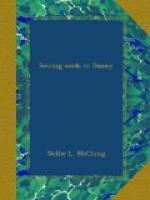When Maudie made inquiries of Pearl Watson as to her Sabbath-day attire, her motives were more kindly than Pearl thought. Maudie’s mother was giving her a party. Hitherto the guests upon such occasions had been selected with great care, and with respect to social standing, and blue china, and correct enunciation. This time they were selected with greater care, but with respect to their fathers’ politics. All conservatives and undecided voters’ children were included. The fight-to-a-finish-for-the-grand-old-party Reformers were tabooed.
Algernon Evans, otherwise known as the Czar of all the Rooshias, only son of J. H. Evans, editor of the Millford Mercury, could not be overlooked. Hence the reason for asking Pearl Watson, his body-guard.
Millford had two weekly newspapers—one Conservative in its tendencies and the other one Reform. Between them there existed a feud, long standing, unquenchable, constant. It went with the printing press, the subscription list and the good-will of the former owner, when the paper changed hands.
The feud was discernible in the local news as well as in the editorials. In the Reform paper, which was edited at the time of which we write by a Tipperary man named McSorley, you might read of a distressing accident which befell one Simon Henry (also a Reformer), while that great and good man was abroad upon an errand of mercy, trying to induce a drunken man to go quietly to his home and family. Mr. Henry was eulogised for his kind act, and regret was expressed that Mr. Henry should have met with such rough usage while endeavouring to hold out a helping hand to one unfortunate enough to be held in the demon chains of intemperance.
In the Conservative paper the following appeared:
We regret to hear that Simon Henry, secretary of the Young Liberal Club, got mixed up in a drunken brawl last evening and as a result will be confined to his house for a few days. We trust his injuries are not serious, as his services are indispensable to his party in the coming campaign.
Reports of concerts, weddings, even deaths, were tinged with partyism. When Daniel Grover, grand old Conservative war-horse, was gathered to his fathers at the ripe age of eighty-seven years, the Reform paper said that Mr. Grover’s death was not entirely unexpected, as his health had been failing for some time, the deceased having passed his seventieth birthday.
McSorley, the Liberal editor, being an Irishman, was not without humour, but Evans, the other one, revelled in it. He was like the little boys who stick pins in frogs, not that they bear the frogs any ill-will, but for the fun of seeing them jump. He would sit half the night over his political editorials, smiling grimly to himself, and when he threw himself back in his chair and laughed like a boy the knife was turned in someone!




